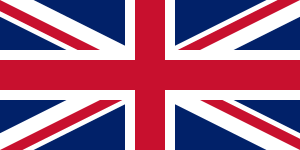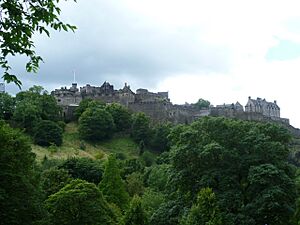British national identity facts for kids

British national identity is about what makes people in the United Kingdom feel connected. It includes shared culture, languages, and traditions. It's about the qualities that bring British people together and make them unique. Things like habits, behaviours, or symbols that are easily recognised as part of the UK's culture. People have different ideas about what Britishness means. Some strongly agree with it, some don't really care, and others might not feel British at all.
The idea of 'Britishness' became very important in politics and studies in the late 1900s. But its roots go back to 1707, when the Kingdom of Great Britain was formed. Even before that, people were called 'Britons' as early as 1682. After 1707, people started to have a "layered" identity. This means they felt British, but also Scottish, English, or Welsh at the same time. In these early days, being British was strongly linked to being Protestant. The word "Britishness" itself, meaning the state of being British, was first used in a magazine in 1857.
Since the late 1900s, there has been a lot of talk about defining and keeping a strong British identity. This has led to debates. For example, the Life in the United Kingdom test, which is a test for people wanting to become British citizens, has caused some arguments. Some political groups say Britishness is about everyone being included, no matter their background. However, some reports suggest that people from Scotland, Wales, Ireland, and other ethnic minorities might feel less British. This is sometimes because English culture seems to be very dominant. Some Welsh politicians have even said that "Britishness" is just another word for "Englishness," which spreads English culture over other groups. Historians note that "Britishness" and "Englishness" are often mixed up because they are both tied to the history of the British Empire and the UK.
Contents
Who Lives in the UK?
The United Kingdom is a diverse place with people from many different backgrounds. This is due to people moving to the UK from other countries.
- According to the 2011 census in England:
* About 85.4% of people were White (including British, Irish, or other European). * 7.8% were Asian (mostly from South Asia). * 3.5% were Black. * 2.3% were of mixed-race heritage. * 0.4% were Arab. * 0.6% identified as another ethnicity.
- Large cities like London have an even higher number of people from non-white backgrounds.
A survey in 2007 found that most people from non-white ethnic groups in Great Britain felt British. Many also identified as English, Scottish, or Welsh.
- Almost 9 out of 10 people with mixed heritage (87%) felt British.
- 85% of Black Caribbean people felt British.
- 80% of Pakistanis felt British.
- 78% of Bangladeshis felt British.
- Interestingly, non-white people were more likely to describe themselves as British than white people. Only one-third of white British people described themselves as British. The rest identified as English, Welsh, or Scottish.
A study in 2005 found that in England, most people from ethnic minority groups felt British first. White English people, however, often felt English first and British second. In Wales and Scotland, most people (both white and ethnic minority) felt Welsh or Scottish first, and British second. But they usually felt that being both identities was perfectly fine.
Some studies have shown that white people sometimes worry about Britishness changing because of immigration. They might also feel that ethnic minorities get unfair benefits. Some people also worry about changes in moral values and political correctness. This frustration was sometimes directed at Muslims. Muslim people in the study said they felt unfairly treated. They also felt pressured to choose between being Muslim and being British, even though they believed they could be both.
British Identity in Different UK Countries
People in different parts of the United Kingdom often have different feelings about their national identity.
England
People in England often identify strongly as English.
Scotland
There is evidence that people in Scotland are increasingly likely to say they are Scottish. They are less likely to say they are British. A 2006 study showed that more than 8 out of 10 people in Scotland saw themselves as Scottish. At the same time, fewer Scots are defining themselves as British. However, more than half of the people in the survey still saw themselves as British.
| Identity | 1997 | 1999 | 2001 | 2003 |
|---|---|---|---|---|
| Scottish not British | 23 | 32 | 36 | 31 |
| More Scottish than British | 38 | 35 | 30 | 34 |
| Equally Scottish and British | 27 | 22 | 24 | 22 |
| More British than Scottish | 4 | 3 | 3 | 4 |
| British not Scottish | 4 | 4 | 3 | 4 |
In the 2011 Census in Scotland:
- 62% identified themselves as Scottish only.
- 18% identified themselves as Scottish and British.
- 8% identified themselves as British only.
A Scottish politician named Kenny MacAskill once said that Britishness is like being Scandinavian. He mentioned shared things like eating fish and chips, chicken masala, and watching TV shows like EastEnders. But he also said that he and his political party (the Scottish National Party) consider themselves Scottish, not British.
Wales
Similar to Scotland, most people living in Wales describe themselves as Welsh. A survey in June 2017 found that 63.2% of people in Wales said their national identity was 'Welsh'. The rest identified as 'Non-Welsh', which included English, Scottish, Irish, British, or Other.
Images for kids



